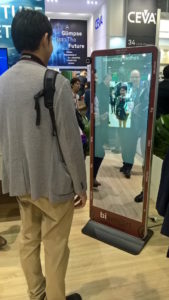Bismart lleva al MWC 2017 su sistema Magic Mirror con reconocimiento facial y análisis de datos
La compañía tecnológica participa estos días en el certamen de movilidad de Barcelona para mostrar este espejo mágico, así como la solución Predictive Maintenance; sus novedades en big data e inteligencia artificial.
 El sistema Magic Mirror de Bismart es un personal shopper programado en el espejo de la tienda que, previo escaneo de la cara, recomienda al cliente la prenda que mejor le sienta. Este espejo mágico que la compañía muestra en MWC 2017 en Barcelona responde a la demanda del mercado en busca de patrones de comportamiento, ocultos en los datos, para descubrir nuevos segmentos de clientes, identificar comportamientos de compra e incluso evitar accidentes.
El sistema Magic Mirror de Bismart es un personal shopper programado en el espejo de la tienda que, previo escaneo de la cara, recomienda al cliente la prenda que mejor le sienta. Este espejo mágico que la compañía muestra en MWC 2017 en Barcelona responde a la demanda del mercado en busca de patrones de comportamiento, ocultos en los datos, para descubrir nuevos segmentos de clientes, identificar comportamientos de compra e incluso evitar accidentes.
A través de tecnología de reconocimiento facial basada en Microsoft Cortana Intelligence Suite, Magic Mirror ofrece a los clientes una experiencia fuera de lo común a la hora de ir de compras. La herramienta agiliza el proceso del comprador al proponer y sugerir los artículos y tendencias potenciales para el cliente, todo basado en las emociones, los gustos, los intereses y el historial de compras del cliente.
Las sugerencias proceden de un personal shopper BOT programado en el espejo de la tienda, proporcionando al cliente un punto de contacto innovador con la tienda y la marca. El funcionamiento es sencillo: el cliente sólo tiene que caminar hasta el espejo y dejar que la herramienta reconozca quién es y muestre su perfil personal.
Magic Mirror reconocerá los rasgos del cliente, y analiza si prefiere las últimas tendencias de temporada, comprar alguna prenda más casual o bien un artículo con el precio rebajado. El cliente visualiza imágenes de sí mismo con los trajes sugeridos, pudiendo escoger la ropa y complementos que mejor le combinen.
 In addition, Magic Mirror permite al cliente conectarse a las redes sociales y compartir las imágenes de las compras anticipadas con sus amigos, recibiendo en directo sus opiniones y comentarios. Una vez que ha elegido su compra, el sistema le aporta información útil como la ubicación exacta del artículo en la tienda, y de las cajas con menor espera en las que puede realizar el pago.
In addition, Magic Mirror permite al cliente conectarse a las redes sociales y compartir las imágenes de las compras anticipadas con sus amigos, recibiendo en directo sus opiniones y comentarios. Una vez que ha elegido su compra, el sistema le aporta información útil como la ubicación exacta del artículo en la tienda, y de las cajas con menor espera en las que puede realizar el pago.
Para Albert Isern, CEO de Bismart, “analizar el comportamiento, las necesidades y la actitud del consumidor para tener un mejor conocimiento de los clientes es uno de los principales usos de la inteligencia artificial. Las empresas utilizan, en mayor o menor medida, técnicas de big data para capturar, tratar y analizar gigantescos volúmenes de datos para predecir el futuro. Ése es el objetivo. Anticiparse”.
La tecnología de mantenimiento predictivo utiliza complejos modelos estadísticos, combinados con el Internet de las Cosas (Internet of Things – Iot), para predecir cuándo, dónde y por qué se producirán fallos de maquinaria, optimizando las tareas de mantenimiento e incrementando la satisfacción de los usuarios.
 Specifically, el mantenimiento predictivo hace uso de complejos modelos estadísticos a partir de toda la información recogida de los sensores conectados a la red (Iot), lo que permite conocer de antemano cuándo, dónde y por qué se producirán fallos de maquinaria, for example, optimizando las labores de los equipos de mantenimiento e incrementando la satisfacción de los usuarios.
Specifically, el mantenimiento predictivo hace uso de complejos modelos estadísticos a partir de toda la información recogida de los sensores conectados a la red (Iot), lo que permite conocer de antemano cuándo, dónde y por qué se producirán fallos de maquinaria, for example, optimizando las labores de los equipos de mantenimiento e incrementando la satisfacción de los usuarios.
Otro de los proyectos de la tecnológica Bismart es EBC Bruselas, en el que colabora con su solución de mantenimiento predictivo para la asistencia sanitaria. La división Microsoft Western Europe cuenta con una instalación permanente en su centro de demostraciones (Executive Briefing Center – EBC), ubicado en la capital belga, a la que se ha denominado Cities of the future (ciudades del futuro), que contempla proyecciones futuras y hacia dónde llevará el análisis de datos, el aprendizaje automático y el IoT.
Esta solución detecta la contaminación del aire que, combinada con otras variables, como la congestión del tráfico, los cambios en el clima y el historial de ingresos a urgencias por enfermedades respiratorias, proporciona alertas tempranas de los niveles potencialmente peligrosos de contaminación en el aire de una ciudad en tiempo real, lo que permite a los gobiernos tomar medidas preventivas para evitar daños graves a la salud de su población.
You liked this article?
Subscribe to our Feed And you won't miss a thing.














